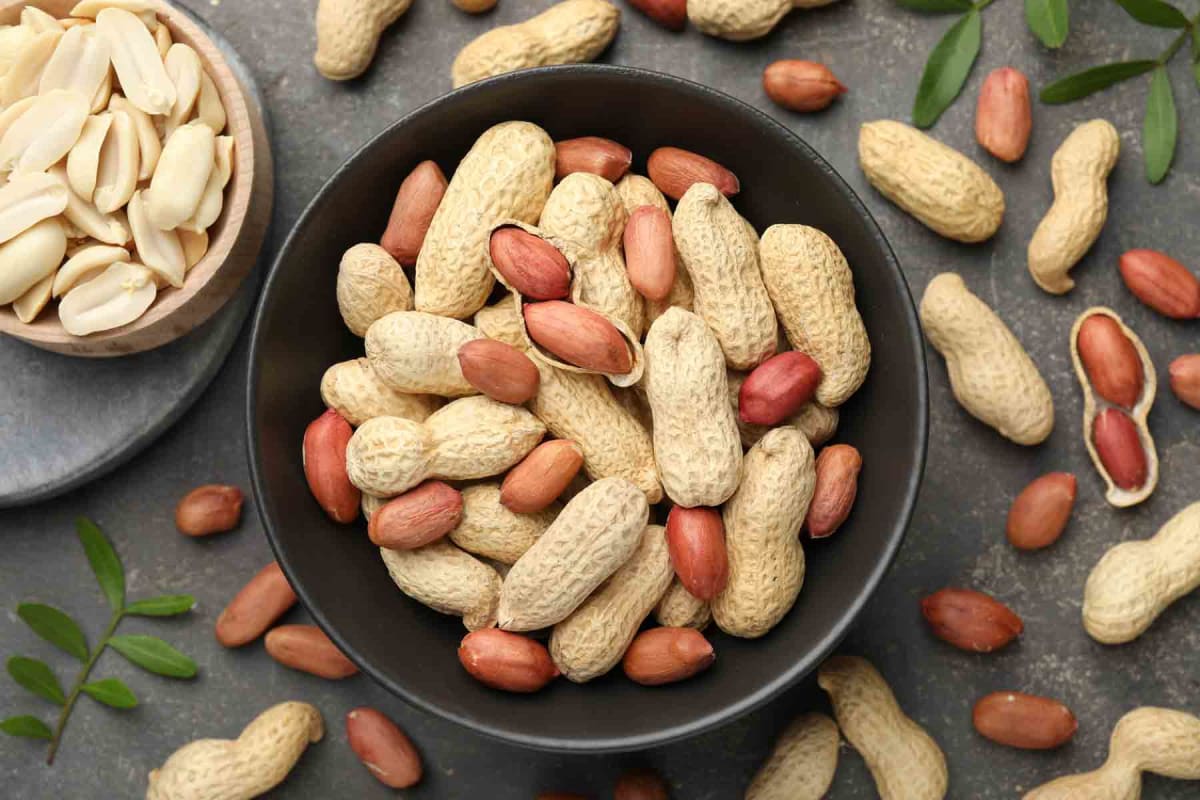
Can dogs eat peanuts?
Can dogs eat peanuts?
Can dogs have peanuts?
Dogs can eat peanuts, but with several important caveats. Plain, unsalted peanuts are safe for most dogs in moderation. These legumes contain protein, vitamins B-6 and E, nutrients like selenium, magnesium, phosphorus, and niacin, and healthy fats that can benefit your dog.
However, not all forms of peanuts are equal when it comes to canine consumption, and some dogs should avoid peanuts entirely. How you prepare and serve the peanuts also makes a significant difference in whether they're appropriate for your four-legged friend. Let's explore everything you need to know about dogs and peanuts.
Are peanuts bad for dogs?
While plain peanuts are not toxic to dogs and can be safe in small amounts, there are several risks associated with feeding peanuts to dogs that every pet owner should understand:
Aflatoxins: Peanuts can sometimes contain aflatoxins, which are toxins produced by certain molds that grow on agricultural crops. Long-term exposure to aflatoxins can lead to liver damage and potentially even liver cancer in dogs.
Lectins: Peanuts contain plant proteins called lectins, which can be difficult for some dogs to digest. These proteins may cause digestive issues, immune system problems, and interfere with your pup's ability to absorb nutrients.
Additives: Many packaged peanuts come with salt, spices, or other seasonings that can be harmful to dogs. Salt in particular can lead to sodium ion toxicity if consumed in large amounts, causing vomiting, diarrhea, tremors, and even seizures.
Xylitol: This artificial sweetener is extremely toxic to dogs and is in some specialty peanut butter brands. Even small amounts can cause rapid insulin release, leading to hypoglycemia (low blood sugar), seizures, liver failure, or death. Always check the ingredient label carefully.
Fats: While peanuts contain healthy fats, they're also high in fat overall. A diet too rich in fats can lead to pancreatitis in dogs, a painful inflammation of the pancreas that can be serious and even life-threatening. Dogs with a history of pancreatitis or obesity should avoid peanuts entirely.
Can dogs have boiled peanuts?
Boiled peanuts are generally not recommended for dogs. The cooking process often involves salt and sometimes seasonings that can be harmful to dogs. Additionally, the soft texture of boiled peanuts may present a choking hazard.
If you must share boiled peanuts with your dog, ensure they're plain (no salt or seasonings) and offer only a small amount.
Can dogs eat peanut shells?
No, dogs should never eat peanut shells. These fibrous coverings are difficult to digest and can cause intestinal blockages or damage to your dog's digestive tract. They may also pose a choking hazard, especially for smaller dogs.
Always remove the shells before offering peanuts to your canine companion.
What about peanut butter?
Peanut butter can be a safe treat for dogs when chosen carefully, and most dogs love it. Look for natural peanut butter with no added salt, sugar, or other ingredients. The only ingredient should be peanuts. Alternatively, make your own peanut butter so you can be 100% sure of its ingredients and freshness.
As mentioned earlier, always check that the peanut butter doesn't contain xylitol, which is extremely toxic to dogs. Popular brands like Jif, Skippy, and Peter Pan typically don't contain xylitol, but always verify by checking the ingredient list.
How to safely feed peanuts to your dog
If you've decided to offer peanuts to your dog as an occasional treat, follow these guidelines to ensure their safety:
Always ensure the peanuts are fresh and show no signs of mold.
Choose only plain, unsalted, unflavored peanuts without the shell.
Make sure the peanuts are dry-roasted or raw.
Start with a small amount to test for allergic reactions.
Chop or crush the peanuts for smaller dogs to prevent choking.
Remember that treats, including peanuts, should make up no more than 10% of your dog's daily caloric intake.
How many peanuts can my dog have?
The appropriate serving size depends on your dog's size, weight, and overall health. As a general guideline:
Small dogs (under 20 pounds): 1 to 2 peanuts occasionally
Medium dogs (20 to 50 pounds): 3 to 5 peanuts occasionally
Large dogs (over 50 pounds): 5 to 10 peanuts occasionally
"Occasionally" means once or twice a week at most. Peanuts should never become a daily treat due to their high fat content.
Alternative treats for dogs
If you're concerned about the risks associated with peanuts, there are plenty of other healthy foods that dogs can eat, including:
Apple slices (without seeds)
Carrots
Blueberries
Green beans
Commercial dog treats formulated for your dog's size and needs
These alternatives provide vitamins and nutrients without the risks that peanuts might pose for some dogs. Always introduce new foods gradually and in small amounts to monitor for any adverse reactions.
When to call your vet
If your dog consumes peanuts with shells, salted or flavored peanuts, or any peanut product containing xylitol, contact your veterinarian or an after-hours emergency veterinary hospital immediately. Watch for symptoms such as vomiting, diarrhea, lethargy, or abdominal pain after peanut consumption.